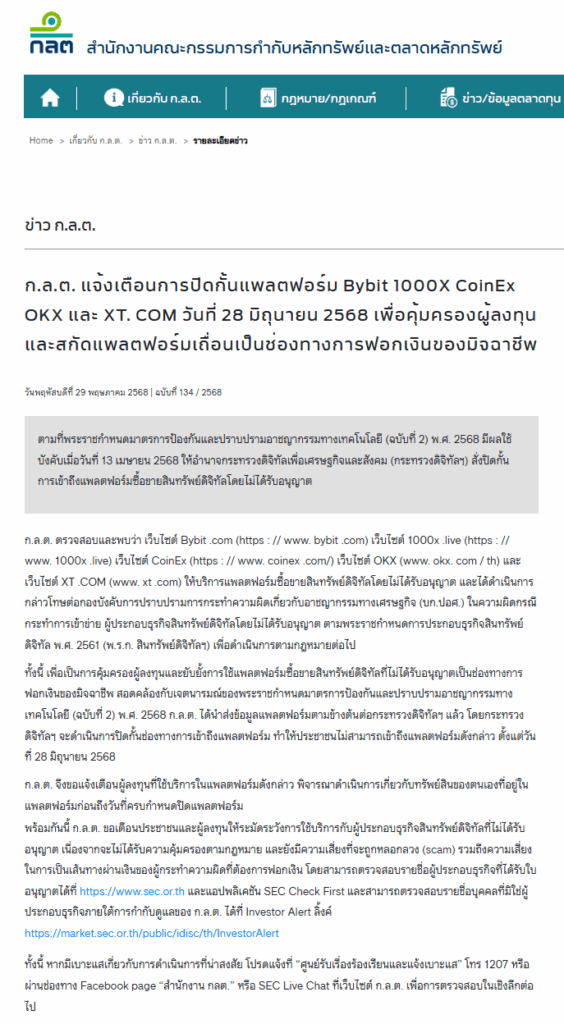
Key takeaways
- The Securities and Exchange Commission (SEC) of Thailand has ordered the Internet Service Providers (ISPs) to block access to Bybit, OKX, CoinEx, 1000X, and XT.COM due to their failure to obtain required licenses, effective June 28, 2025.
- Despite multiple regulatory advisories and a grace period, the exchanges failed to comply with Thailand’s Digital Asset Business Act.
- The SEC cited risks of market manipulation, fraud, and money laundering as key reasons for the crackdown, emphasizing a strong stance on unregulated financial activity.
- Analysts suggest Thailand’s decisive actions may influence neighboring Southeast Asian countries to adopt stricter crypto regulations.
- While enforcing crypto rules, Thailand is also promoting digital finance innovation through initiatives like tokenized bonds and crypto debit cards for tourists, signalling a balanced approach to growth and oversight.
Thailand’s Securities and Exchange Commission (SEC) has ordered internet service providers to block access to five cryptocurrency exchanges — Bybit, OKX, CoinEx, 1000X, and XT.COM — citing their failure to obtain required operating licenses. The measure marks one of the country’s most sweeping actions against unauthorized digital asset platforms to date.
Effective June 28, 2025, the Ministry of Digital Economy and Society will implement technical measures to restrict access to the exchanges. The move follows a formal complaint filed by the SEC with the Economic Crime Suppression Division, citing violations of Thailand’s Digital Asset Business Act B.E. 2561, as shown below:

According to the SEC, the targeted platforms operated within the Thai market without proper licensing, exposing investors to unregulated risks. The regulator emphasized that such operations lack necessary oversight, heightening the threat of market manipulation, fraud, and money laundering.
“This action underscores our commitment to investor protection and maintaining market integrity,” the SEC stated. “Platforms operating without a license pose a direct threat to financial security.”
Yearlong Warnings Culminate in Enforcement Action
The enforcement follows more than a year of regulatory warnings and public advisories. In April 2024, the SEC announced plans to restrict unlicensed platforms, offering companies a grace period to comply. Despite the warnings, the exchanges did not meet legal requirements, prompting the SEC to escalate its response.
The crackdown is part of Thailand’s broader initiative to establish a transparent and secure digital financial environment. The SEC reiterated that all market participants must adhere to strict regulatory standards, including licensing, operational transparency, and anti-money laundering protocols.
Industry analysts view this development as a potential shift toward stricter oversight across Southeast Asia. Thailand’s decisive stance could prompt neighboring countries to reassess their own regulatory frameworks as global pressure mounts to rein in non-compliant crypto entities.
Thailand Implements Dual Strategy: Regulation and Innovation
While reinforcing compliance, Thailand is also advancing innovation in digital finance. The government plans to raise approximately $150 million by issuing tokenized bonds to retail investors. The bonds, offering higher yields than traditional bank products, are part of a broader initiative to digitize public financial instruments through blockchain.
Meanwhile, the Ministry of Tourism and Sports is collaborating with fintech firms to launch crypto-linked debit cards for tourists. These cards will enable foreign visitors to link digital wallets and spend cryptocurrencies more easily in Thailand, supporting the tourism sector.
By balancing firm regulatory enforcement with forward-looking digital finance initiatives, Thailand aims to establish itself as a regional leader in secure, innovation-driven financial development.
Read more: “Crypto Queen” Ngo Thi Theu Arrested in $300M Scam Bust


